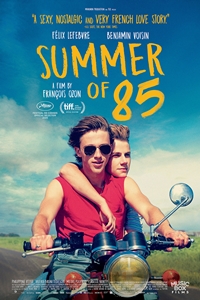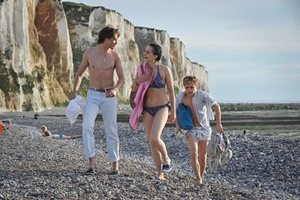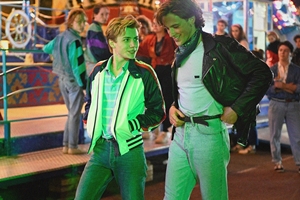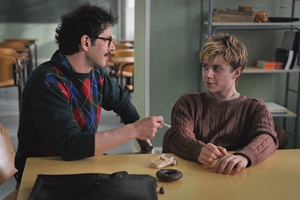Canada: Friday, November 13, 2020
Music Box Films
Summer of 85' is a story of friendship and love between two teenage boys at a seaside resort in Normandy in the mid-1980s. When 16-year-old Alexis capsizes off the coast of Le Tréport, 18-year-old David heroically saves him. Alexis thinks he's just met the friend of his dreams. But will the dream last more than one summer?
Cast & Crew
Movie Cast
Movie Crew
User Reviews
Public Reviews - 1 Reviews
-
Gregory M. - Rated it 3 out of 5
"Summer Of 85" When Alexis (Félix Lefebvre) capsizes off the coast of 'Normandy', David (Benjamin Voisin) comes to the rescue and soon opens the younger boy’s eyes to a new horizon of friendship, art, and sexual bliss. David’s worldly demeanor and 'Jewish' heritage deliver an ardent jolt to Alexis’s traditional, working-class upbringing. After Alexis begins working at the seaside shop owned by Madame Gorman (Valeria Bruni Tedeschi), David’s mother, the two lovers steal every possible moment for a fugitive kiss, a motorcycle ride, or a trip to the cinema. Their relationship is soon rocked by a host of challenges, including an unexpected sexual rival Kate (Philippine Velge) and a romantic oath that transcends life itself. Adapted from Aidan Chambers’s groundbreaking 'LGBT' young adult novel 'Dance On My Grave', "Summer Of 85" is a sexy, nostalgic reverie of first love and it's consequences. Their summer fling lasts just six weeks, but casts a shadow over a lifetime. "Summer of 85" is based on the novel 'Dance On My Grave' by Aidan Chambers. Aidan Chambers (b. 1934) is an English author of youth novels and plays, critical essays and books on the education of readers. He's best known for his novels that make up 'The Dance Sequence Series': 'Breaktime' (1978), 'Dance On My Grave' (1982), 'Now I Know' (1987), 'The Toll Bridge' (1992), 'Postcards From No Man’s Land' (1999), recipient of 'The British Carnegie Medal' and 'The American Michael L. Printz Award'. Among other acknowledgements he was honored with 'The International Hans Christian Andersen Medal' for the body of his work in 2002. He's a Fellow of 'The Royal Society Of Literature'. The book is playful and inventive. It has drawings, press clippings, changing points of view. The book’s tone is rather offhand. The film approaches it from a more dramatic and romantic register. The movie encompasses both the book's reality and our memories of what we feel when first reading it. The soundtrack to our lives is all 'New Wave', 'The Smiths', 'Depeche Mode'. 'The Cure' song, 'In Between Days', which opens the film, marks the heart of 'The 80s' while also remaining timeless. It corresponds to Alex, to his enthusiastic discovery of life, but to it's dark side as well. It’s an extremely joyful song, but fundamentally melancholic. The audience meets David in very ordinary circumstances, for people to sense that there's something corrosive about him and that Alex is going to suffer. "Summer of 85" is firstly a love story before being a story about gay love. Alex and David love one another and the fact that they're two boys is beside the point. Depictions of gay people in the movies in 'The 1980s' are very dark and painful, even before 'AIDS'. Following the codes of the teen movie genre, the film shows the romance between the boys in a very classic way, without irony, David is fatherless, has more intimate knowledge of death. Unlike Alex and his book knowledge of death, David really saw someone die. In Alex’s eyes, he represents the warrior capable of conquering death. In fact, everything about David fascinates Alex. It’s a passionate, all-consuming love! And this love is understandable because David is charming and handsome. He lives in a beautiful house and is a captivating person. Upon seeing him, Alex feels an evident fascination and very quickly falls in love with him. David physically dominate Alex, to have an effortless poise and naturally be at ease with himself. David is a bit like a wild animal while Alex is a lamb whose demeanor is awkward, whether he’s walking or sailing a boat. David helps Alex discover many things; he’s practically a mentor. Sexually, Alex isn’t particularly comfortable with himself nor does he know very much. Thanks to David, he learns to open himself up and he blossoms. Alex is naive and madly in love. He threw himself body and soul into this romance! Naturally, when you give so much of yourself you want to receive in return. And he does receive a great deal from David, but he realizes that David’s love isn’t as strong. David is having a fling. He isn’t in love and as he’s afraid of hurting Alex he prefers to end it before it goes too far. His flirting with Kate is also a way of saying to Alex that he doesn’t belong to him. Alex and David look at love differently. Despite how harsh the breakup scene is we can sense that David does love Alex. Their relationship is unique and at the same time universal. What's striking with Alex isn’t his attraction to men, but that he’s attracted to David. The film is interested in depicting the artistic vocation. How a character is driven to go through self-transcendence as part of the creative process, and what he draws upon for inner nourishment. What's beautiful about Alex’s situation is that he discovers writing almost accidentally; he's incapable of talking about what happened and so is told to write it down in order for the judge to understand what he did and why. Sometimes, things we've a hard time voicing are easier to write down. Especially at that age. As he has a gift for writing, this works in his favor. By becoming a writer, Alex is doubly saved; before the judge and because he has found his vocation. Alex has a very resilient side thanks to his writing, which allows him to transform the ordeal he has gone through and move forward. The family in Aidan Chambers’ book is 'Jewish'. The town of 'Southend-on-Sea' has a large 'Jewish Community'. It therefore seemed natural for David to be 'Jewish', and at the same time set him apart from Alex with respect to their social and cultural backgrounds. Just like being gay, it belongs to the narrative just like it's other parts. There's also a narrative reason, which has to do with 'Jewish' post-mortem and funeral rituals. In 'Judaism', the body should be buried as soon as possible, the funeral usually taking place within one or two days after the deathm Alex could not mourn with the body, nor could he be among the mourners. These restrictions increased his emotional trauma and fueled his psychological need to dance on David's grave. It's the only way for Alex to express his profound sorrow and let everything out. If David had been 'Christian', Alex would not have had to endure the same torments following David’s death. Kate’s (Philippine Velge) is 'Norwegian' in the book. The film makes her 'English' especially because our '1980s' experience is heavily influenced by 'British' pop culture, like most teenagers at the time. Kate has both the grace and maturity that helps Alex through the mourning process. The flirty professor (Melvil Poupaud) is really nice but a little bit creepy. Madam Gorman is able to make us accept her more dramatic. David and his mother can also form a toxic pair. David pushes Alex into his mother’s arms, and she undresses him in the bathroom. There’s a moment when we see this mother and son together in a shot, both with a tiger’s piercing and predatory look in their eyes. Some scenes are slightly more humorous, but later the film tones down the comical side to be wholly with the boys, to experience their love story straightforwardly. And in the second half of the movie, with the mourning and what their pact entailed, there's even less room for comedy. It's important to establish a genuine rapport with the characters and to convey the emotion we feel as a teenager. The scene with 'The Walkman' is an homage to "La Boum", but also foreshadows how David and Alex are out of synch with each othe. This dance scene is clearly the heart of the film. Alex and David aren’t dancing to the same music. One is fidgeting about and laughing while the other is daydreaming, staring at the ball hanging from the ceiling. At this point in the story, we experience this disconnect as if it's game between them, not suffering. It’s only in retrospect that we can re-interpret the scene as the early warning signs of their separation. The scenery is realistic, but 'The 80s' are a little idealized as far as the costumes are concerned. In the end, we believe this fraternal aspect served the relationship. Alex projects onto David, who represents a sort of big brother, or model, a fantasized image of what the future could be. Alex is fascinated by death. Everyone in their own way is intrigued by the mystery of death. It's also what defines life. For Alex, death is akin to his archenemy, he needs to understand it so as not to be caught unaware. He wants to confront it, have an idea of what's waiting for him. To do that he studies funerary rituals, 'Egyptian' traditions. For 'Fhe Egyptians', death is not an ending but a new and truthful beginning. Life is merely preparation for death, which is a battle to reach immortality. This research allowed me to better understand how Alex derives strength from thinking about death. 'The only important thing is that somehow we all escape our history', says Alex in voice over at the very end of the film. After the dance, Alex can overcome David’s disappearance and return to living his life. The film.transforms the material, playing on the suspense of what really happened. That’s the big difference the film has with the novel, in which we know from the onset what Alex did and why. The movie lets the mystery dwell and creates false leads, which allow the audience to imagine several different possibilities. The result is very sensual on the skin in closeups. There's a subtlety in the color that can’t be achieved with digital, which tends to dull things down. 1985 is also the year Rock Hudson died, and 'AIDS' suddenly appeared in everyone’s daily life. It’s the last year of carefreeness and innocence, when it's still possible not to be aware of the disease, and not to worry about it. The story is memory combined with an attempt to make sense of it. It’s an act of meditation. It’s not merely a record of experience but telling the stories of our experience that makes us who and what we're and changes us, adds to us, makes us more than we're at the time of the experiences. We're more accurately, we become, the stories we tell about ourselves, whether they're an attempt to ŵtell it like it's’ or are those we invent. All memory is invention. written by Gregory Mann




